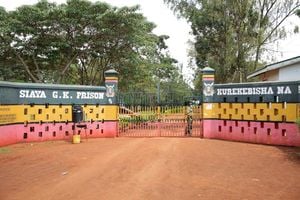Race to succeed CBK boss Njuguna Ndung’u gathers pace

From left, top row: Dr Chris Kiptoo: Country director, Trademark EA, Dr Kamau Thugge: PS, National Treasury, Mr Philip Kinisu: Former chairman PWC Africa board, Dr Mbui Wagacha: Acting Central Bank chairman. Bottom row: Mr Isaac Awuondo: CEO, Commercial Bank of Africa, Dr Haron Sirma: Deputy Governor, Central Bank, Dr Edward Sambili: Former Deputy CBK governor, Mr John Ngumi: Chairman Konza Tech Dev. Authority. PHOTOS | NATION MEDIA GROUP
What you need to know:
- Prof Ndung’u’s tenure at the helm of the bank charged with formulating the country’s financial and monetary policy will come to an end on March 4.
- President Uhuru Kenyatta is expected to hand-pick the next governor due to the delay in enacting the new Central Bank of Kenya (CBK) Bill.
The search for a new governor of the Central Bank of Kenya has started in earnest, ahead of the retirement of Prof Njuguna Ndung’u, whose second and final term expires in a month.
Prof Ndung’u’s tenure at the helm of the bank charged with formulating the country’s financial and monetary policy will come to an end on March 4. This has opened the position for high political lobbying.
President Uhuru Kenyatta is expected to hand-pick the next governor due to the delay in enacting the new Central Bank of Kenya (CBK) Bill that would have opened the appointment to a competitive process.
National Treasury Cabinet Secretary Henry Rotich told the Nation in an interview that the draft Bill was yet to be approved by the Cabinet, and therefore, had not been tabled in Parliament yet.
“The Bill will be presented in Parliament when it resumes. But there is no lacuna, we will proceed with what is existing,” he said.
POWER TO HIRE
The fact that Parliament is on recess until mid-February means that the appointment will be made under the current law, which gives the President the power to hire a candidate of his choice.
Sources said the position has attracted huge interest from some of Kenya’s top economists.
Among those mentioned in the race to succeed Prof Ndung’u is Dr Mbui Wagacha, who has been acting as the CBK chairman since February 2013, when legislative changes were made to the Central Bank of Kenya Act.
Dr Wagacha is a renowned macroeconomist and policy expert with experience spanning over 20 years, having consulted for the Association of African Central Banks, the World Bank and the African Development Bank, among others.
The current deputy governor, Dr Haron Sirma, is also a possible candidate. Dr Sirma, also an economist, has worked at CBK for about 28 years and was appointed deputy governor in 2011.
Those in the know said that the National Treasury principal secretary, Dr Kamau Thugge, was also a top contender for the highly influential position.
Former PWC Africa board chairman Phillip Kinisu — with over 30 years of experience in financial management — is also mentioned as being in the frontline to take over when Prof Ndung’u retires.
Trade Mark East Africa country director Chris Kiptoo, and Commercial Bank of Africa Group CEO Isaac Awuondo were also among those named as likely candidates as are Vivienne Yeda Apopo, who has been a non-executive director of the CBK board since 2011 and Sheila Mbijiwe who formerly sat in the CBK Monetary Policy Committee.
The current chairman of the Konza Technopolis Development Authority and director of Investment Banking at Standard Bank Group, John Ngumi, is also a likely candidate.
Others are former CBK deputy governor Edward Sambili and Mwangi Kimenyi of Brookings Institution.
The successful appointee will serve for a single term of six years as opposed to the current regime where one can serve two terms of four years each.
REMARKABLE INCIDENTS
The next governor will also have a lot to learn from Prof Ndung’u, whose stint at the helm of the bank has not been without remarkable incidents, both positive and negative.
Last year, Prof Ndung’u was named the sub-Saharan Africa Central Bank Governor of the Year in recognition of “his stewardship of the Central Bank of Kenya, that has inspired faith and confidence in Central Bank policy among key stakeholders”.
This came barely two years after a survey by Reuters ranked him the worst banker in Africa in December 2011, following the historic deceleration of the shilling when it exchanged at Sh107 to the US dollar.
Prof Ndung’u will be remembered for many things, among them the operationalisation of the Monetary Policy Committee in 2008 and the introduction of the Kenya Bankers Reference Rate last year, both indicative rates upon which commercial banks are expected to price their loans.





